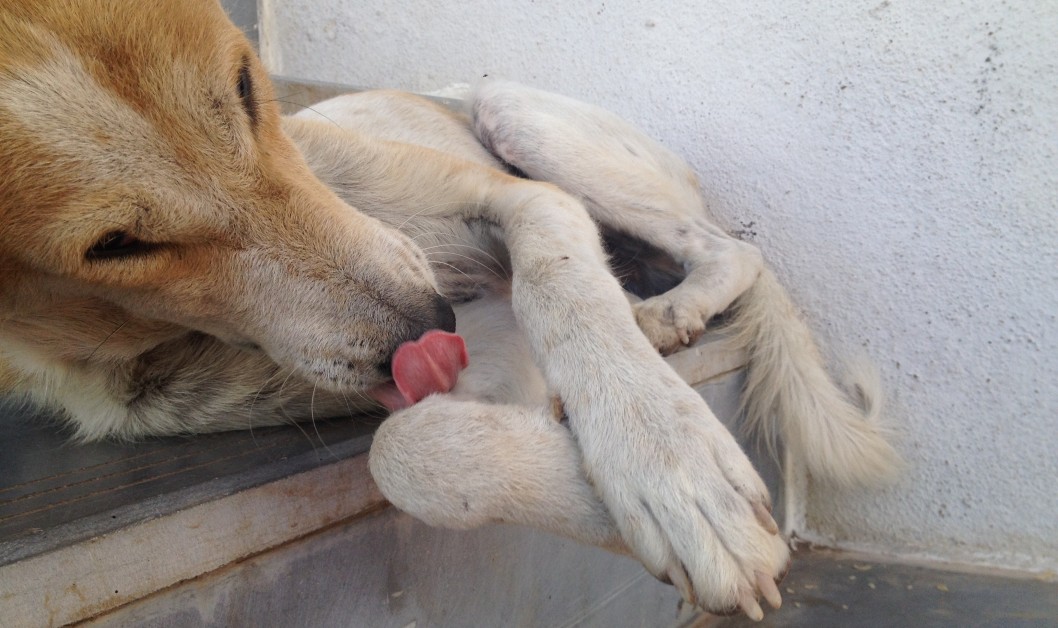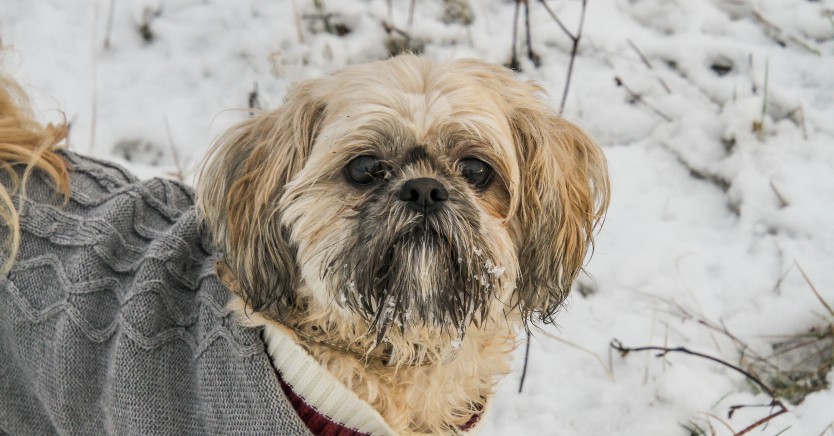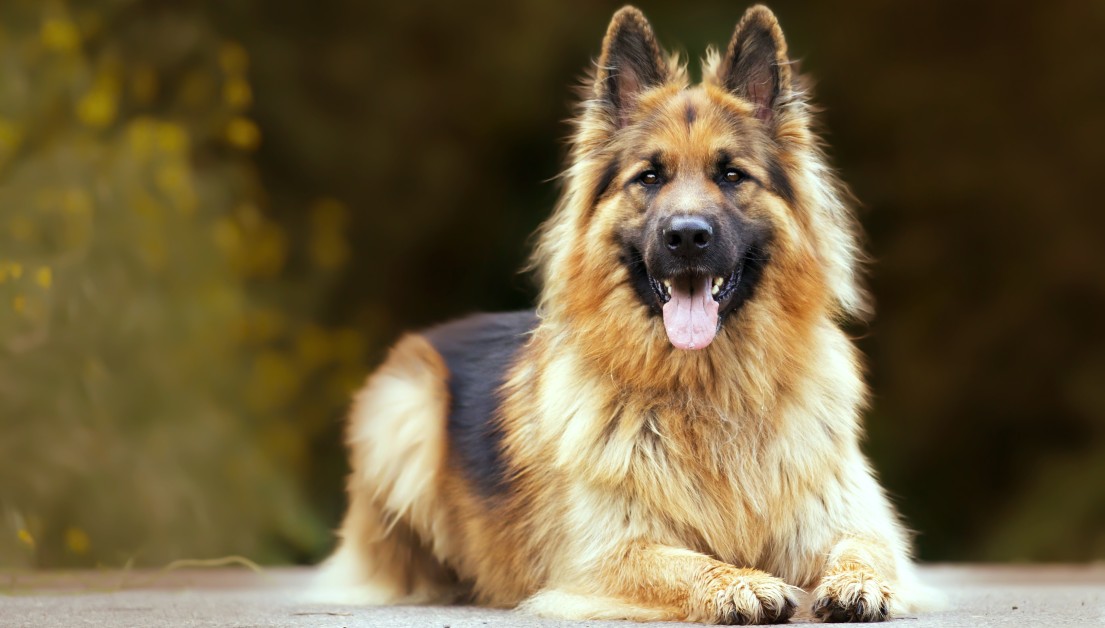Excessive Paw Licking in Dogs
Learn why dogs lick or chew their paws -- and what you might need to do about it.

When you think of pets grooming themselves with your tongues, images of cats probably spring to mind. But dogs groom themselves by licking their paws as well. While this behavior may be totally normal, it can also indicate a hidden health concern that needs to be diagnosed and dealt with. Let's take a look at the many reasons for dog paw chewing and licking, including physical and emotional challenges that can benefit from veterinary treatment.
Possible Causes of Abnormal Dog Paw Licking
There's nothing inherently strange about your dog licking or chewing idly at its paws once in a while, especially after they've been outdoors getting those paws filthy. Dogs like to have clean feet, and licking is one simple way to clear away irritating dirt and debris without having to succumb to a dreaded bath. But there's a difference between casual paw licking and aggressive or obsessive paw licking. If your dog seems to lick or bite its paws constantly, here are some potential reasons to consider:
- Injuries - Dogs will typically lick an injured part in an effort to soothe the acute pain. That pain may occur due to fractures, sprains, strains, paw pad burns, or exposure to irritating chemicals such as de-icer fluids. If your dog is limping or refusing to put weight on the paw in question, or if you see redness, swelling, or other signs of injury, it's time to visit the vet.
- Stings and Bites - Bees, wasps, and other stinging insects can compel your dog to lick the stung or bitten area. In these cases, any remaining stinger needs to be removed promptly. Fleas and ticks can also produce pain and irritation in your dog's paws, while bites from mosquitos and mites can cause maddening itching.
- Allergies - Allergies can produce skin redness, swelling, itching, and inflammation. In addition to reactions from exposure to external allergens -- a problem known as contact dermatitis -- allergic reaction to certain foods can affect a dog's skin, including the skin of the paws.
- Skin Growths - A limping dog doesn't always have a fracture or other acute injury. Instead, it may suffer from a cyst or other uncomfortable growth that irritates the paws or paw pads, compelling your dog to lick or chew the growth.
- Athritis - Dogs can develop arthritis just as humans can. Arthritis in the joints of the feet can create chronic pain. Arthritis is typically a byproduct of age, so watch for this telltale symptom as your dog gets older andr joints start moving more stiffly.
- Dementia - Elderly dogs don't always start licking their paws obsessively because of arthritis pain. This form of obsessive behavior may occur in association with a neurological issue such as dementia. Other dementia symptoms such as disorientation, sleep changes, and changes in your dog's attitudes toward other family members may help to confirm the problem.
- Emotional Problems - The calming effect of paw licking in dogs makes it a form of emotional "self-therapy." For instance, dogs may lick their paws constantly to soothe emotional issues such as fear and anxiety. Obsessive-compulsive disorder (OCD) can also manifest itself as obsessive paw licking or chewing.
Why You Need to Address Excessive Dog Paw Licking
Don't dismiss excessive dog paw licking as just something Fido likes to do. As noted above, it could point toward a serious underlying health problem that requires evaluation and treatment. At the same time, the longer you let the issue go unaddressed, the longer your poor pet must experience the discomfort that forces it to lick or bite its paws.
Obsessive dog paw chewing and licking can also produce complications of its own. One of the most common is a condition known as acral lick dermatitis or lick granuloma. As your dog gnaws away at its paw, the skin there grows increasingly inflamed and damaged until an open wound forms. This open wound can then allow germs to enter, producing an infection that needs immediate treatment.
How Your Veterinarian Can Help
Veterinarians understand how to identify the causes of dog paw licking and prescribe the right care strategy to resolve the problem. For example, an acute injury such as a fracture may require anything from a brace or splint to surgery, while an uncomfortable skin growth may call for surgical removal. Stings, bites, and allergic reactions may respond well to antihistamines and anti-inflammatory drugs. Chronic pain conditions such as arthritis may benefit from anti-inflammatory drugs, pain relievers, nutritional supplements, and gentle exercise.
If your veterinarian can find no physical cause for the paw licking, your dog may need to be checked for a neurological or emotional disorder. While canine dementia has no cure, a combination of medications and lifestyle changes around the home can ease your dog's distress. If your dog appears to have an anxiety disorder or OCD, the answer may lie in a combination of drug therapy and behavioral training to relieve the feelings that force your dog to lick its paws.
Paw licking in dogs can spell trouble, but you don't have to let it ruin your pet's quality of life. Make an appointment to schedule a veterinary evaluation where you can discover the underlying cause and get your furry friend the treatment he needs!
When you think of pets grooming themselves with your tongues, images of cats probably spring to mind. But dogs groom themselves by licking their paws as well. While this behavior may be totally normal, it can also indicate a hidden health concern that needs to be diagnosed and dealt with. Let's take a look at the many reasons for dog paw chewing and licking, including physical and emotional challenges that can benefit from veterinary treatment.
Ready to start saving money on pet wellness care?
Then take a look at Mint Wellness, the pet wellness plan that provides fast reimbursement on routine pet care. Save on vaccinations, wellness exams, preventatives, dental, and more!
Learn More
.jpg)

